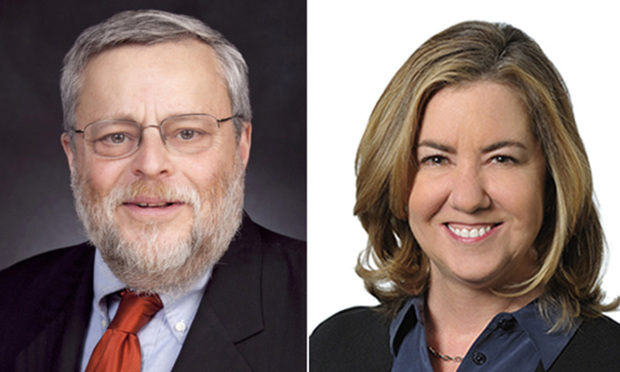Recent Supreme Court and D.C. Circuit Decisions Concerning Arbitration
In their Arbitration column, Samuel Estreicher and Holly H. Weiss discuss 'New Prime v. Oliveira', in which the Supreme Court ruled on an exception to arbitrability under §1 of the Federal Arbitration Act (FAA), 9 U.S.C. §1, and 'Diag Human v. Czech Republic', in which the U.S. Court of Appeals for the D.C. Circuit ruled on the binding nature of foreign arbitral awards.
March 15, 2019 at 02:40 PM
7 minute read
 Samuel Estreicher and Holly H. Weiss
Samuel Estreicher and Holly H. Weiss
The Supreme Court and U.S. Court of Appeals for the D.C. Circuit Court have each recently decided cases involving arbitration. The Supreme Court, in New Prime v. Oliveira, ruled on an exception to arbitrability under §1 of the Federal Arbitration Act (FAA), 9 U.S.C. §1, and the D.C. Circuit, in Diag Human v. Czech Republic, ruled on the binding nature of foreign arbitral awards.
'New Prime'
In New Prime v. Oliveira, 586 U.S. ___ (2019), the Supreme Court, in an 8-0 decision (Justice Kavanaugh did not participate in the decision), expanded the scope of an exemption under the FAA that applies to certain transportation workers. The case concerned Dominic Oliveira, a truck driver, who worked as an independent contractor for New Prime. When he began working for New Prime, Oliveira signed an agreement that included an arbitration clause. After New Prime made deductions to Oliveira's pay, Oliveira brought a class action law suit against New Prime that alleged Fair Labor Standards Act violations and state law claims. At the district court, New Prime moved to compel arbitration. Under §2 of the FAA, an agreement to arbitrate is “valid, irrevocable, and enforceable, save upon such grounds as exist at law or in equity for the revocation of any contract.” 9 U.S.C. §2. Oliveira responded that the court lacked authority to compel arbitration because of §1 of the FAA, which provides an exception to the enforceability of arbitration provisions in disputes involving interstate transportation workers. New Prime then argued that the applicability of §1 was a question for the arbitrator, not the court. The district court denied New Prime's motion to compel arbitration, and the U.S. Court of Appeals for the First Circuit affirmed.
On appeal, the Supreme Court took up two issues: (1) whether a dispute over the applicability of the FAA's §1 exemption must be resolved in arbitration pursuant to a valid clause delegating the question of arbitrability to the arbitrator; and (2) whether the FAA's §1 exemption, which applies only to “contracts of employment” involving transportation workers, applies to agreements establishing an independent contractor relationship. In regard to the first question, the court held that “a court should decide for itself whether §1's 'contracts of employment' exclusion applies before ordering arbitration” even if the agreement contains a valid delegation clause. Delegation clauses are “merely a specialized type of arbitration agreement” and are therefore subject to §1's exception. Thus, it is for the court to determine whether §1 applies.
Turning to the second question, the court looked to the historical meaning of “contracts for employment.” Based on dictionary definitions of the word “employment” from around the time that Congress passed the FAA in 1925 and the statute's use of “workers” in the same context, the court concluded that “employment” should be construed as a synonym for “work.” Just as the term “employment,” as Congress intended it, does not distinguish between an employer-employee relationship and an independent contractor-purchaser of services relationship, the term “worker,” in the context of §1, also does not distinguish between an employer-employee relationship and an independent contractor-purchaser of services relationship. Therefore, to give proper meaning to §1, the court determined that the exception applies to both employees and independent contractors working in transportation.
The holding in New Prime stands out in the court's recent jurisprudence concerning arbitration. Until now, the court's decisions had worked to strengthen the FAA's arbitration regime. New Prime, however, in expanding §1's exception to arbitration, serves as a modest counterpoint.
'Diag Human S.E.'
The U.S. Court of Appeals for the D.C. Circuit recently held that an arbitral award in favor of a Liechtenstein-based company, Diag Human, and against the Czech Republic, was not binding under the New York Convention because an arbitration review panel, authorized under Czech law for arbitrations held in that country, issued a “Resolution” discontinuing the proceedings without first confirming the underlying award. Diag Human S.E. v. Czech Republic—Ministry of Health, 907 F.3d 606 (D.C. Cir. 2018)
Diag Human runs a blood plasma business and initiated arbitration in the 1990s with the Czech Republic after the Czech Republic allegedly interfered with its business. The initial arbitration panel found that the Czech Republic had wrongfully interfered and that Diag Human was entitled to damages. The panel, however, left the specific amount of damages for later proceedings. In 2002, another panel awarded partial damages of approximately $10 million, an amount representing damages that neither party disputed. Pursuant to the arbitration agreement that the parties had entered into, the parties were entitled to seek a review of arbitral awards. A review panel upheld the award for partial damages. Four years after the partial award, another arbitral panel awarded $400 million for the full extent of damages plus interest. Again, the parties submitted the award to a review panel. This time, the review panel issued a “Resolution” that discontinued the arbitration. However, the panel did not explicitly affirm the $400 million award.
Diag Human sought to enforce the arbitral award in the U.S. court system and filed suit under the New York Convention in the U.S. District Court for the District of Columbia. The district court declined to enforce the $400 million award, finding that it was not binding on the parties. The district court reasoned that under the New York Convention, U.S. courts will generally enforce foreign arbitral awards; however, under the Convention, a court will not recognize an arbitral award if it “has not yet become binding on the parties.” New York Convention Art. V(1)(e). Under the terms of the arbitration agreement, an appeal of an arbitral award to a review panel prevents the award from becoming binding. Because the appeal of the $400 million award was proper, that award was not binding unless the review panel confirmed the award, which it failed to do.
The D.C. Circuit affirmed, but with different reasoning. The appeals court looked to the language of the Resolution, which noted jurisdictional problems with the $400 million award. The award, according to the review panel, was barred by res judicata because it was based on the same claim as the 2002 award. The D.C. Circuit interpreted the review panel's Resolution to conclude that the 2002 award never specified that it was only in regard to a portion of the claims or a portion of the defendants. Thus, the 2002 award was not partial, but was the complete award.
The D.C. Circuit also looked to Czech arbitral law, which identifies two possible outcomes from an arbitral proceeding: an award (which is judicially enforceable and imposes a legal obligation) or a resolution (which ends the proceedings). Because the review panel chose to issue a resolution, and not an award, the panel did not affirm the $400 million award but instead closed the proceedings. The D.C. Circuit therefore held that the $400 million award was not enforceable and subsequently denied a request from Diag Human for a rehearing en banc. The decision illustrates the perils of enforcing foreign arbitral awards in other countries.
Samuel Estreicher is the Dwight D. Opperman Professor and Director of the Center for Labor and Employment Law at New York University School of Law. Holly H. Weiss is a partner at Schulte Roth & Zabel.
This content has been archived. It is available through our partners, LexisNexis® and Bloomberg Law.
To view this content, please continue to their sites.
Not a Lexis Subscriber?
Subscribe Now
Not a Bloomberg Law Subscriber?
Subscribe Now
NOT FOR REPRINT
© 2025 ALM Global, LLC, All Rights Reserved. Request academic re-use from www.copyright.com. All other uses, submit a request to [email protected]. For more information visit Asset & Logo Licensing.
You Might Like
View All
Skadden and Steptoe, Defending Amex GBT, Blasts Biden DOJ's Antitrust Lawsuit Over Merger Proposal
4 minute read
Come Fly With Me: DOJ’s Proposed FARA Amendments and the Tourism Industry
10 minute readTrending Stories
Who Got The Work
J. Brugh Lower of Gibbons has entered an appearance for industrial equipment supplier Devco Corporation in a pending trademark infringement lawsuit. The suit, accusing the defendant of selling knock-off Graco products, was filed Dec. 18 in New Jersey District Court by Rivkin Radler on behalf of Graco Inc. and Graco Minnesota. The case, assigned to U.S. District Judge Zahid N. Quraishi, is 3:24-cv-11294, Graco Inc. et al v. Devco Corporation.
Who Got The Work
Rebecca Maller-Stein and Kent A. Yalowitz of Arnold & Porter Kaye Scholer have entered their appearances for Hanaco Venture Capital and its executives, Lior Prosor and David Frankel, in a pending securities lawsuit. The action, filed on Dec. 24 in New York Southern District Court by Zell, Aron & Co. on behalf of Goldeneye Advisors, accuses the defendants of negligently and fraudulently managing the plaintiff's $1 million investment. The case, assigned to U.S. District Judge Vernon S. Broderick, is 1:24-cv-09918, Goldeneye Advisors, LLC v. Hanaco Venture Capital, Ltd. et al.
Who Got The Work
Attorneys from A&O Shearman has stepped in as defense counsel for Toronto-Dominion Bank and other defendants in a pending securities class action. The suit, filed Dec. 11 in New York Southern District Court by Bleichmar Fonti & Auld, accuses the defendants of concealing the bank's 'pervasive' deficiencies in regards to its compliance with the Bank Secrecy Act and the quality of its anti-money laundering controls. The case, assigned to U.S. District Judge Arun Subramanian, is 1:24-cv-09445, Gonzalez v. The Toronto-Dominion Bank et al.
Who Got The Work
Crown Castle International, a Pennsylvania company providing shared communications infrastructure, has turned to Luke D. Wolf of Gordon Rees Scully Mansukhani to fend off a pending breach-of-contract lawsuit. The court action, filed Nov. 25 in Michigan Eastern District Court by Hooper Hathaway PC on behalf of The Town Residences LLC, accuses Crown Castle of failing to transfer approximately $30,000 in utility payments from T-Mobile in breach of a roof-top lease and assignment agreement. The case, assigned to U.S. District Judge Susan K. Declercq, is 2:24-cv-13131, The Town Residences LLC v. T-Mobile US, Inc. et al.
Who Got The Work
Wilfred P. Coronato and Daniel M. Schwartz of McCarter & English have stepped in as defense counsel to Electrolux Home Products Inc. in a pending product liability lawsuit. The court action, filed Nov. 26 in New York Eastern District Court by Poulos Lopiccolo PC and Nagel Rice LLP on behalf of David Stern, alleges that the defendant's refrigerators’ drawers and shelving repeatedly break and fall apart within months after purchase. The case, assigned to U.S. District Judge Joan M. Azrack, is 2:24-cv-08204, Stern v. Electrolux Home Products, Inc.
Featured Firms
Law Offices of Gary Martin Hays & Associates, P.C.
(470) 294-1674
Law Offices of Mark E. Salomone
(857) 444-6468
Smith & Hassler
(713) 739-1250







